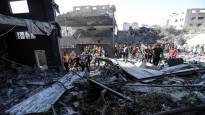The first Finnish-Palestinian Loay Abuwarda cried and hugged her children. Abuwarda had just crossed the border from Gaza to Egypt with his wife and four children. The family had survived 26 days amid Israeli bombardment.
– It was awful. I have never seen anything like that, Abuwarda describes the bombings.
The Abuwarda family from Gaza were the first Finns to get out of Gaza on Wednesday, November 1. They were in the area visiting their relatives. It is estimated that there are still at least six Finns in Gaza.
43-year-old Abuwarda moved to Finland with his wife Rasha Mahmoudin with in 2015. He had not been to Gaza for more than ten years before his trip in October. The family’s children aged 5-12 had never met their grandparents or other relatives living in Gaza.
– My close relative was very ill, so we traveled to Gaza for paperwork. I decided to use the opportunity so that the children could get to know their Palestinian roots.
The vacation had lasted a couple of weeks when the war broke out. The bombings were concentrated in the city of Gaza, where the family was visiting Abuwarda’s father.
The family first took shelter in a UNRWA school, then in the Al-Nasr Children’s Hospital, where they spent three weeks. According to Abuwarda, the hospital was full of people, and there was hardly any food or water.
– We received 500 loaves of bread every other day, which were distributed among 1,400 people. People were fighting each other over pieces of bread and little water, Abuwarda says about the conditions in the hospital.
The escape took a dangerous turn
Israel has urged those in the northern parts of the Gaza Strip to move to the southern part of the area. However, movement in the area is dangerous due to the constant shelling.
Abuwarda says that the situation in the hospital and in Gaza City became more and more difficult and desperate.
– It started to seem clear that if we stay there, we will die. The trip south to the Egyptian border was dangerous, but the risk had to be taken, says Abuwarda.
The family decided to leave for the border town of Rafah in a convoy of three civilian cars on Wednesday, November 1. At that time, the Rafah border crossing was opened for the first time for the evacuation of civilians.
Abuwarda says that she got the names of her family members on the list of evacuees the head of the Finnish representation in Ramallah Päivi Peltokoski through.
On the way, according to Abuwarda, the car convoy came under fire, and one of the cars was hit.
– I was sure we were going to die. The children were crying. We waved a white cloth, as those in the hit car had also done, says Abuwarda.
As if by a miracle, the family made it safely to the border and across it to Egypt, says Abuwarda.
– We were among the last to get out of Gaza that Wednesday.
Rasha Mahmoud, Abuwarda’s wife, also told Chinese CCTV about the border crossing.
has not been able to confirm the story about the car convoy being bombed.
According to the UN, about 1,500 people had reached Egypt from Gaza between Wednesday and Friday of last week. There are wounded Palestinians among them.
There are still an estimated 350,000-400,000 people in northern Gaza.
Thanks to the Finnish diplomats
The Abuwarda family’s journey continued from the Rafah border crossing first to the city of Arish on the Sinai Peninsula and finally to Cairo, the capital of Egypt.
According to Abuwarda, the ambassador Pekka Kosonen accommodated the family in his home.
– He wanted to make sure that our children are all right. We enjoyed a Finnish dinner at his place, Abuwarda says.
In addition, Abuwarda thanks Päivi Peltokoski, head of the Ramallah representative office.
– I think I stayed strong with the help of his contacts. While we were in Gaza, he regularly checked to see if we were okay.
Prime minister Petteri Orpon On the other hand, he would have hoped for a stronger grip on the protection of civilians in Gaza from the (collective) government.
– I do not speak for the Gaza administration, but for the civilians. There are good people there, says Abuwarda.
Now Abuwarda is at home in Turku with his family. They finally got to Finland on Saturday.
According to Abuwarda, the family is now focusing on spending time together.
He says that he still hasn’t really gathered his thoughts about the events of the last month. He says he is worried about how the family’s children will be able to forget the horrors of war.
– We haven’t been able to contact our relatives in Gaza either. The children wonder what happened to their cousins, uncles and grandparents, says Abuwarda.
